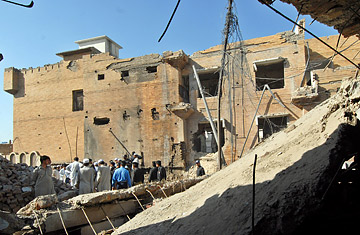
A car bomb exploded next to a police station in a northwestern city Friday, killing three people and ending a five-week lull in the deadly explosions.
One of Pakistan's most notorious militant leaders, Baitullah Mehsud, accused of being behind scores of deadly bombing attacks, has declared a cease-fire in the troubled Waziristan region bordering Afghanistan. Mehsud's declaration came as Pakistan's new government announced that it was close to a peace deal with tribal leaders there. "We will give the nation good news very soon regarding the peace initiative," Interior Affairs Adviser Rehman Malik told reporters on Thursday.
Since assuming power last month, the government has embarked on a radical new approach to extremism that favors reconciliation over the military force that was the hallmark of President Pervez Musharraf's strategy for the past several years. Western diplomats have watched from the sidelines with unease. While they encourage reconciliation with low-level militants and tribal leaders, when it comes to al-Qaeda and top-level commanders, "you have got to draw the line," says one. "We have lists of people that are probably irreconcilable."
So what happens when an "irreconcilable" like Baitullah Mehsud declares a cease-fire? As head of the militant umbrella group Tehrik-e-Taliban Pakistan, Mehsud has waged a devastating campaign in Waziristan against government forces for the past year. Now local journalists there report that he has circulated leaflets commanding his followers to halt attacks in preparation for peace talks. The move has been greeted with relief by the military, which has lost nearly 1000 troops to militant activity over the past several years. "Any cessation of hostilities is a welcome step," military spokesman Major General Athar Abbas told AFP.
But hardly a definitive one. A cease-fire could provide an opening for real negotiations and would allow the thousands of refugees from the region to return home. But Mehsud, said to be a superior tactician, could also use a pause to rebuild his forces. And if he is able to make a cease-fire stick, he'll have demonstrated an alarming cohesion within the militancy. "If the militants are able to shut down attacks, and keep them shut down for this period of time, it proves that the terrorist attacks were not by freelance bombers," says Marvin Weinbaum, scholar in residence at the Middle East Institute in Washington and a former Pakistan expert at the U.S. Department of State. "What they can turn off, they can turn back on."
Yet even if Mehsud can turn off attacks in Waziristan, there's no evidence he can control militants elsewhere in Pakistan. Today a car bomb at a police station in the town of Mardan in the northwest killed four and injured 30. Militants there say the blast was in revenge for the death of a rebel leader who was killed by police three weeks ago, but insist that the cease-fire is still in effect. "We abide by our announcement of a cease-fire. Today's attack was to level the score with police," Taliban spokesman Maulvi Omar told AFP.
That's hardly an encouraging start to negotiations, and neither is the track record. A controversial peace accord in 2006 dissolved in a spate of attacks on military forces and allowed extremists to regroup. The government contends that current negotiations are more likely to stick since they're being conducted with tribal leaders, not just with militants.
Talking to Mehsud may help protect Pakistan, says Weinbaum, but would ultimately do little to prevent international terrorism. Mehsud wants the Pakistan government to withdraw the military from the tribal areas and allow him to continue his war against NATO troops in Afghanistan. "Even if the Pakistani government gets a good deal, it would still only be a kind of containment policy," says Weinbaum. "Our interests will not be served by this. It has very little implication for what we are interested in — breaking up terrorist networks, al-Qaeda, and impeding the insurgents going into Afghanistan."
Military commanders in the region foresee more attacks in Afghanistan if negotiations succeed. Nearly 100,000 Pakistani troops have been deployed to the border regions, and they have suffered significant losses, leaving the government without the strength to insist on not talking. "We will have to swallow the consequences of [the Pakistan army's] incapacity for the next two or three years," says one NATO official in Afghanistan. "Which means the potential for terrorism increases over here."
Richard Boucher, Assistant Secretary for South and Central Asian Affairs at the U.S. State department, says he hopes Islamabad has learned from the mistakes made in the 2006 deal. "Ultimately you have to be prepared to use military force to enforce the agreement," he says. The problem is that the militants know that, too, and may well intend to use the cease-fire to bulk up in preparation for that enforcement.
